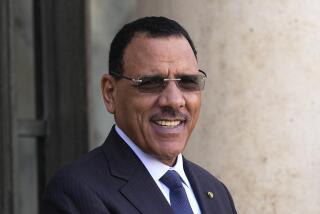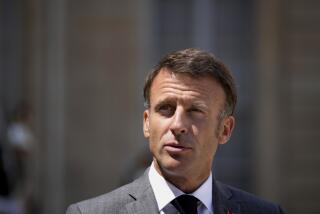Nigerian Military Dictator Steps Down, Installs Interim Regime
- Share via
LAGOS, Nigeria — Gen. Ibrahim Babangida stepped down as Nigeria’s president and military commander Thursday, handing power to a mostly civilian government he cobbled together in the final hours of his eight-year dictatorship.
While the government is supposed to rule only until elections next year, the changeover nevertheless fell short of fulfilling Babangida’s repeated promises to step down and hand power to an elected government.
Human rights activists immediately called the government an “extension of dictatorship.” A general strike to protest the government kept Lagos quiet Thursday, and gas, oil, airport and other workers planned strikes Saturday.
It remains to be seen in the coming weeks whether the interim government will gain public acceptance and be able to act independent of the military that has long ruled the country.
Babangida stepped down in a simple ceremony.
In his sprawling hillside fortress in Abuja, the capital, the 52-year-old military ruler got up from his chair and let former corporate executive Ernest Shonekan, 57, take the seat as the new chief executive.
The only military representative in the new 32-member Cabinet is Defense Minister Gen. Sani Abacha, a powerful soldier who took part in the 1985 coup that brought Babangida to power.
But the army will retain a military council with the authority to act as it sees fit.
Babangida defended his regime, insisting that it laid the foundations for democracy and tried to rescue a sliding economy.
Nigeria, Africa’s most populous country with 90 million people, has vast oil and natural gas reserves that have been squandered by corruption and mismanagement.
Babangida had abruptly annulled the June 12 presidential election that was to produce a civilian successor, plunging the nation into the worst crisis since a 1967 civil war that killed 1 million people.
The move drew public outrage, international sanctions and mobilized a diverse opposition movement. The apparent winner of the June ballot, Moshood K. O. Abiola, has fled to London because of death threats but vows to return.
Shonekan, who attended Harvard business school, will now come under enormous pressure to hand over power to Abiola. A highly respected businessman, Shonekan has kept a low profile during the political crisis but is viewed as a Babangida puppet.
More to Read
Sign up for Essential California
The most important California stories and recommendations in your inbox every morning.
You may occasionally receive promotional content from the Los Angeles Times.













